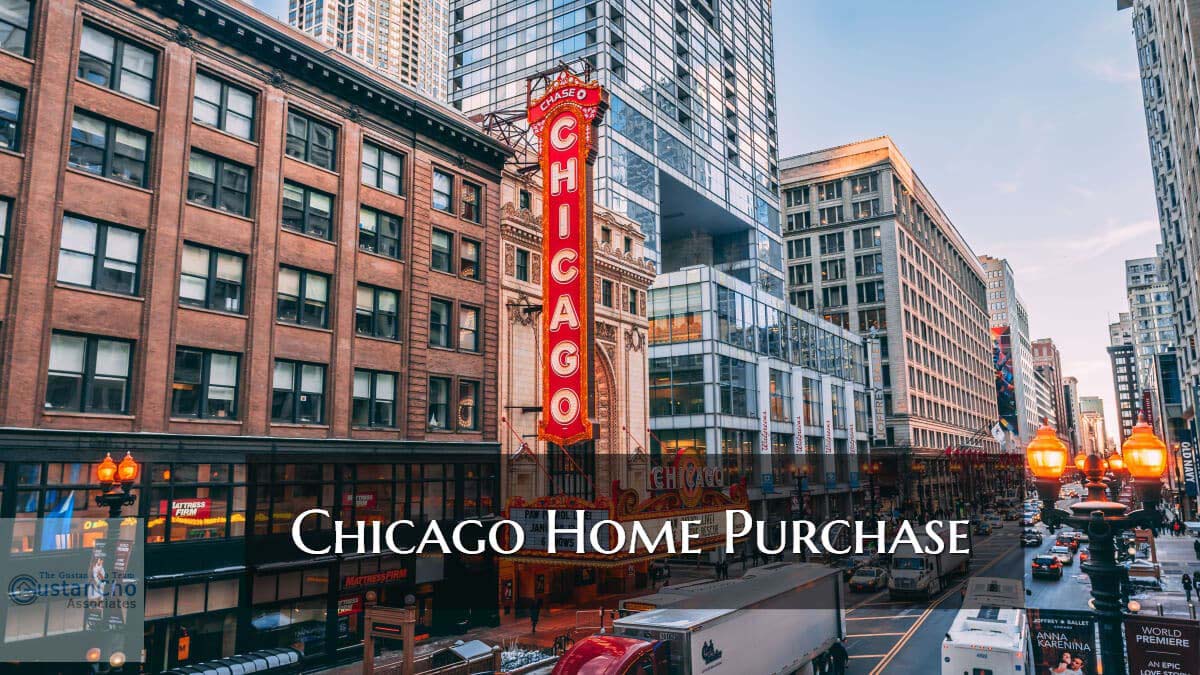Guide To Chicago Home Purchase
This guide covers Chicago home purchase. Thinking about buying a home in the city of Chicago? You may want to rethink a Chicago Home Purchase after reading this article. City has one of the highest tax rates among all major cities in the United States. Property taxes, sales, gas, income, vehicle stickers, and extra city taxes are expensive in Chicago. The city requires all city employees to be residents of Chicago.
It costs more money to close a Chicago Home Purchase loan. This is because Chicago has additional taxes on real estate closings. A Chicago Home Purchase also comes with additional transfer stamps for any property located within Chicago City Limits. Now with all of these extra revenues that the city is taking in, the City of Chicago should be rich, right? WRONG.
Chicago has one of the worst financial statements and budget shortfall year after year. Some experts say the city is on the verge of bankruptcy. It is not how much you make but how much you spend. The City has one of the nation’s worst budget deficits. Many blame the economic mess on incompetent politicians. With the city in such a financial mess, will a Chicago Home Purchase make sense? Will it be wise to trigger a Chicago Home Purchase? How are Chicago’s financial chaos and incompetent politicians affecting homeowners and future Chicago home purchase buyers?
Will New Chicago Mayor Make A Difference For Homebuyers
Rahm Emmanuel has proven to be a major disappointment to Chicagoans as the Mayor of Chicago. Mayor Rahm Emmanuel decided not to seek another term. This paved way for 14 mayoral candidates to become the next Chief Executive of Chicago. The top names who lost are former Mayor Richard M. Daley’s brother, Bill Daley, and former Chicago Police Superintendent Garry McCarthy.
Garry McCarthy was the former Chicago Superintendent who Rahm Emmanuel fired. The top two candidates left to become the next Mayor of the Windy City are Lori Lightfoot and Toni Preckwinkle. Lightfoot vows to change Chicago’s machine politics and restore the city to profitability.
Chicagoans no longer care that Chicago will have their first female African American Mayor in the April 2nd Mayoral Election. They care more about the financial stability of the city. Each homeowner is affected by at least $125,000 to get Chicago back to profitability. This deficit will deter smart home buyers from a Chicago Home Purchase.
Pension Debt By The City Of Chicago
For decades, having a government job in Chicago was security for life. Chicago police officers and firefighters make six figures. Besides having such high salaries, they get stellar benefits. An average Chicago police officer with 30 years of experience can retire with 75% pay and full benefits. Let’s do some basic numbers.
A police officer joins the Chicago Police Department at the age of 21 years old. The officer works for 30 years and retires at 51 years old. This police officer will receive 75% of the $100,000 salary he earned when he retired.
This equals $75,000 for the rest of this officer’s life. Fifty-one years old is very young, and this police officer will likely start a second career. This type of pension is available to all city government employees in Chicago. The city does not have enough funds to pay out these types of public worker pension debt.
Risks Associated With Chicago Home Purchase and Homeownership
Chicago is one of the most beautiful cities in the world. There are hundreds of nationalities representing its residents. Chicago has the finest restaurants. The city has the best ethnic restaurants out of any city in the United States.
The city is home to internationally renowned colleges and universities. The University of Chicago, Northwestern University, DePaul University, and The University of Illinois all have campuses in the city.
Korean Town, China Towns, Ukrainian Villages, Greek Town, Polish Town, Little Italy, German Town, Vietnamese Town, and many other ethnic towns exist in the Great City of Chicago, with thousands of businesses and residents. Downtown Chicago is probably the most beautiful downtown of any city in the United States, if not the world.
How Mayoral Race Can Affect Chicago Home Purchase
Tens of thousands of residents and businesses are fleeing Chicago and Illinois due to high taxes. Many are on stand-by on Chicago Home Purchase. Home buyers who want to purchase a home in Chicago want to wait until the April 2nd, 2019, Mayoral Election. They want to see what the new mayor will do to improve Chicago.
If the new mayor is like Rahm Emmanuel, many will steer away from Chicago Home Purchase. Every politician wants to reward their city employees. Every politician wants to spend and spend and spend.
However, politicians need to run government like they are running a business. That is why President Donald Trump was very successful and had to clean up Obama’s mess. Stay tuned. Gustan Cho Associates will update our viewers on more Chicago Home Purchases and Housing Market news.
The Midwest’s Surprising Lack of Affordable Housing Options
Were you looking for affordable housing in the Midwest? You might be surprised that it’s more challenging than you think. Despite being known for its affordability and quality of life, the Midwest faces a housing crisis that has left many struggling to find suitable living arrangements. This blog post explores why the Midwest’s lack of affordable housing options is becoming increasingly problematic and how to overcome the obstacle. Read on to learn more!
Introduction to the Midwest Housing Crisis
The Midwest has long been considered the heartland of America, a region known for its friendly Midwestern values and a strong sense of community. However, in recent years the Midwest has been facing a housing crisis that is quickly making it one of the most expensive regions in the country to live in.
The problem began during the housing boom of the early 2000s when prices for single-family homes in the Midwest started to rise at an unprecedented rate. The rise was partly due to investors from coastal regions buying up properties in the Midwest as second homes or investment properties, driving up prices even further.
At the same time, many young people were moving to the Midwest for jobs in the burgeoning tech and startup industries. With more people competing for fewer homes, prices skyrocketed, leaving many middle-class families out of the market. With more people competing for homes, the situation worsened because new construction needed to catch up with demand, resulting in a severe shortage of affordable housing options.
High Prices For a Chicago Home Purchase
Today, the average price of a home in the Midwest is nearly double what it was just a decade ago, and rents have increased by almost 60%. The increasing rent has strained families struggling to make ends meet and has forced many into homelessness or waiting lists for government-subsidized housing.
There is no easy solution to this crisis, but it is clear that something needs to be done to address the need for more affordable housing options in the Midwest.
The Midwest housing crisis is a problem that has been escalating for years. The region has seen a decrease in the availability of affordable housing and an increase in the number of people who are homeless or at risk of becoming homeless. The problem is exacerbated by the fact that many of the region’s cities are experiencing population declines, which means fewer potential renters or buyers for the existing housing stock.
Factors Negatively Contributing To The Midwest Housing Crisis
Many factors have contributed to the Midwest housing crisis. One is the loss of manufacturing jobs in the region, which has led to decreased wages and increased poverty. Another factor is the increasing cost of housing, which has made it difficult for people on fixed incomes or low incomes to keep up with rent or mortgage payments.
The problem is also compounded by the fact that there is a limited supply of affordable housing options in many Midwest cities. The consequences of the Midwest housing crisis are far-reaching. They include increased homelessness, evictions, and foreclosures; strains on social service providers.
Negative impacts on mental health and overall well-being. The crisis also disproportionately affects people of color and other marginalized groups, who often have fewer resources and safety nets to fall back on when they experience housing insecurity or homelessness. There are several ways to address the Midwest housing crisis, but it will require commitment from all government and private sector involvement. Some possible solutions include investing in affordable housing initiatives.
Causes of The Chicago Home Purchase Shortage in the Midwest
There are several causes for the housing shortage in the Midwest. One is that the region has experienced significant population growth in recent years, while the number of homes available has not kept pace. This is especially acute in cities like Chicago and Minneapolis, which have seen a boom in young professionals seeking jobs in the growing economy.
Another factor is that many available homes are too expensive for most people. The median home price in the Midwest is over $200,000, while the median income is only around $50,000. This means that even if people could find a place to live, they would be spending a huge chunk of their income on housing costs.
There is also a need for more affordable rental options in the Midwest. According to a recent report, nearly half of all renters in the region are considered “cost-burdened,” meaning they spend more than 30% of their income on rent. This leaves little room for other expenses and can make saving up for a down payment on a home difficult. The housing shortage in the Midwest is having a ripple effect throughout the economy.
Who is The Most Affected By Chicago Home Purchase Shortage?
In the Midwest, the lack of affordable housing options affects people of all income levels. The most affected are those with low-income or fixed incomes, such as seniors on Social Security or people with disabilities. People who are employed but don’t make much money struggle to find affordable housing. A recent study found that nearly half of all renters in the Midwest spend more than 30% of their income on rent, which is considered unaffordable.
Again the shortage of affordable housing is also impacting families and children. Many communities need to be safe and affordable places for families to live. This can lead to homelessness or families having to move frequently, which can disrupt children’s education and stability.
Many factors contribute to the Midwest’s lack of affordable housing options, but one of the most significant is the region’s rapidly growing population. According to the latest Census data, the Midwest’s population grew by nearly 5% between 2010 and 2018, while the number of housing units in the region increased by just 3%. This imbalance has led to a tight housing market and rising prices, disproportionately affecting low- and middle-income families.
Financial Crisis in The City of Chicago Home Purchase
A recent study found that nearly half of all renters in the Midwest are considered “cost-burdened.” This leaves little room for other essentials like food, transportation, and healthcare. For those already struggling to make ends meet, the shortage of affordable housing options can be devastating. If you or someone you know is struggling to find affordable housing in the Midwest, some resources are available to help. Your local Housing Authority or community development office is a good place to start. They can provide information about available programs and assistance.
Strategies for improving affordable housing options in the Midwest
Several strategies can be implemented to improve affordable housing options in the Midwest. One strategy is to increase funding for affordable housing initiatives at the local, state, and federal levels. Another strategy is incentivizing developers to build more affordable housing units. Additionally, zoning laws and regulations can be reformed to allow for more density and mixed-use developments, which can help increase the affordable housing supply.
One way to increase funding for affordable housing initiatives is through public-private partnerships. For example, Chicago has partnered with several private companies and philanthropic organizations to create the Chicago Community Catalyst Fund, which will provide $100 million in financing for affordable housing developments.
Private companies can also be incentivized to invest in affordable housing through tax breaks or other financial incentives. Zoning laws and regulations are often a barrier to increasing the supply of affordable housing. In many cases, these laws limit the density that can be built in an area, which drives up the cost of land and construction.
Reforming Chicago Home Purchase Laws
Reforming these laws could help make building more affordable housing units easier and more cost-effective. Additionally, changing zoning regulations to allow for more mixed-use developments could also help increase the supply of affordable housing and provide residents with access to essential amenities and services.
Another approach is to create or preserve existing subsidized housing units. This can be done through public-private partnerships, using public funds to buy and rehabilitate properties, or creating community land trusts.
There is no one-size-fits-all solution to the affordable housing crisis in the Midwest. But there are many strategies that communities and policy-makers can pursue to address the problem. Businesses need help finding workers as help; they need help to afford to live near their job sites.
How To Increase The Supply of Affordable Chicago Home Purchase Numbers
One way to increase the supply of affordable housing is to make it easier for developers to build more units. This can be done by streamlining the permitting process, incentivizing developers who create affordable units, and reforming zoning laws for more density. Families are forced to move further away from urban areas in search of more affordable housing options.
In addition, policies can be put in place to help low-income families afford rent. One example is the Housing Choice Voucher program, which helps families with limited incomes cover a portion of their rent payments. Other options include increasing funding for affordable housing programs or providing tax breaks for renters.
Regardless of the strategy, involving all stakeholders in the decision-making process will be important – from residents and community groups to developers and government officials. Only by working together will we find lasting solutions to the affordable housing crisis in the Midwest. Get affordable home in Chicago, Click here
What are Creative Solutions And low-income renters are being pushed out of neighborhoods as gentrification drives up rents. To Chicago Home Purchase Crisis
The Midwest has a surprising lack of affordable housing options. This is due to several factors, including the region’s declining population, the high cost of living in rural areas, and the lack of investment in affordable housing initiatives.
There are many creative solutions to this problem. One solution is to create incentives for developers to build more affordable housing. This can be done by providing tax breaks or other financial incentives.
Another solution is creating community land trusts to help decrease housing costs. Another solution is to encourage the development of micro-housing units that are smaller than traditional apartments and can be more affordable.
In Summary of Chicago Home Purchase Crisis
There is no one-size-fits-all solution to the affordable housing crisis in the Midwest, but some creative solutions have been effective in other regions. One solution is to create incentives for developers to build more affordable housing. This can be done by offering tax breaks, zoning changes, or other financial incentives. Another solution is to increase funding for existing affordable housing programs.
This can be done at the local, state, or federal level. It is important to promote policies that encourage mixed-income housing developments. This ensures that low- and middle-income families can access quality housing options.
The Midwest’s lack of affordable housing options is a serious problem that has been largely overlooked. With the rapid rise in home prices, many people cannot find homes within their budget, which can have lasting effects on families and communities. It is important for state governments to take action and create more affordable housing options so that everyone has access to safe and comfortable living conditions.
Investing in Affordable Housing in the Midwest
Investing in affordable housing will help individuals and benefit entire cities by creating jobs, boosting local economies, and providing stability to communities. If you should decide to buy, before you begin looking for a home and during the process, we have vast experience working with buyers to get them ready to purchase their dream home.
We can take you through your home loan’s entire buying and financing process. We also can connect you to title companies/attorneys and real estate agents in your area that can help as needed.
Call or text Ronda Butts at 407-460-7999 or email at ronda@gustancho.com for more information and further assistance. Ronda is an experienced referral agent, a dually licensed real estate agent, and a mortgage originator. She has successfully guided many homeowners through obtaining a home on both the lending and real estate side. She does not represent buyers or sellers but offers free consultation in 48 states at Gustan Cho by connecting homeowners, buyers, and sellers to the needed sources.







